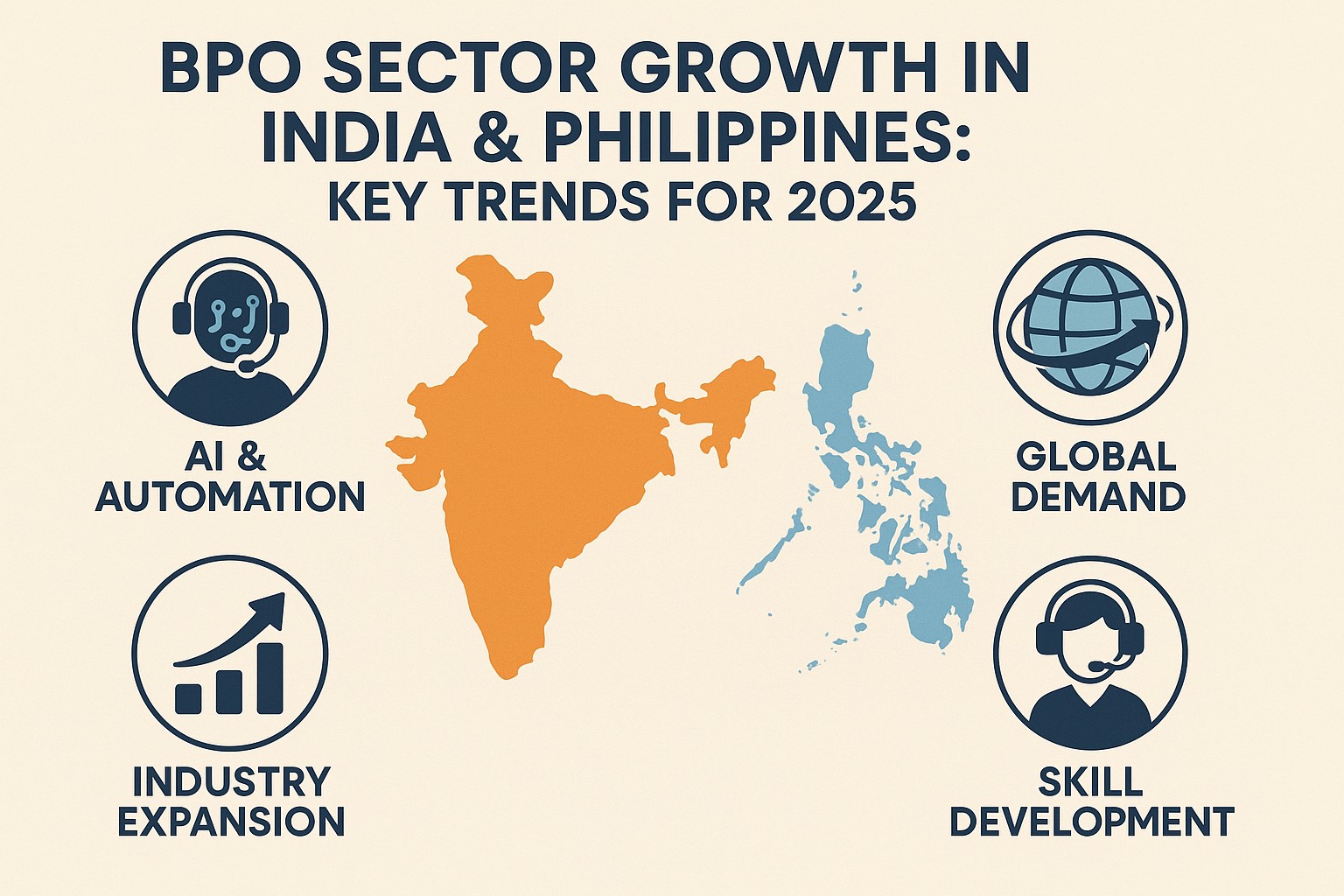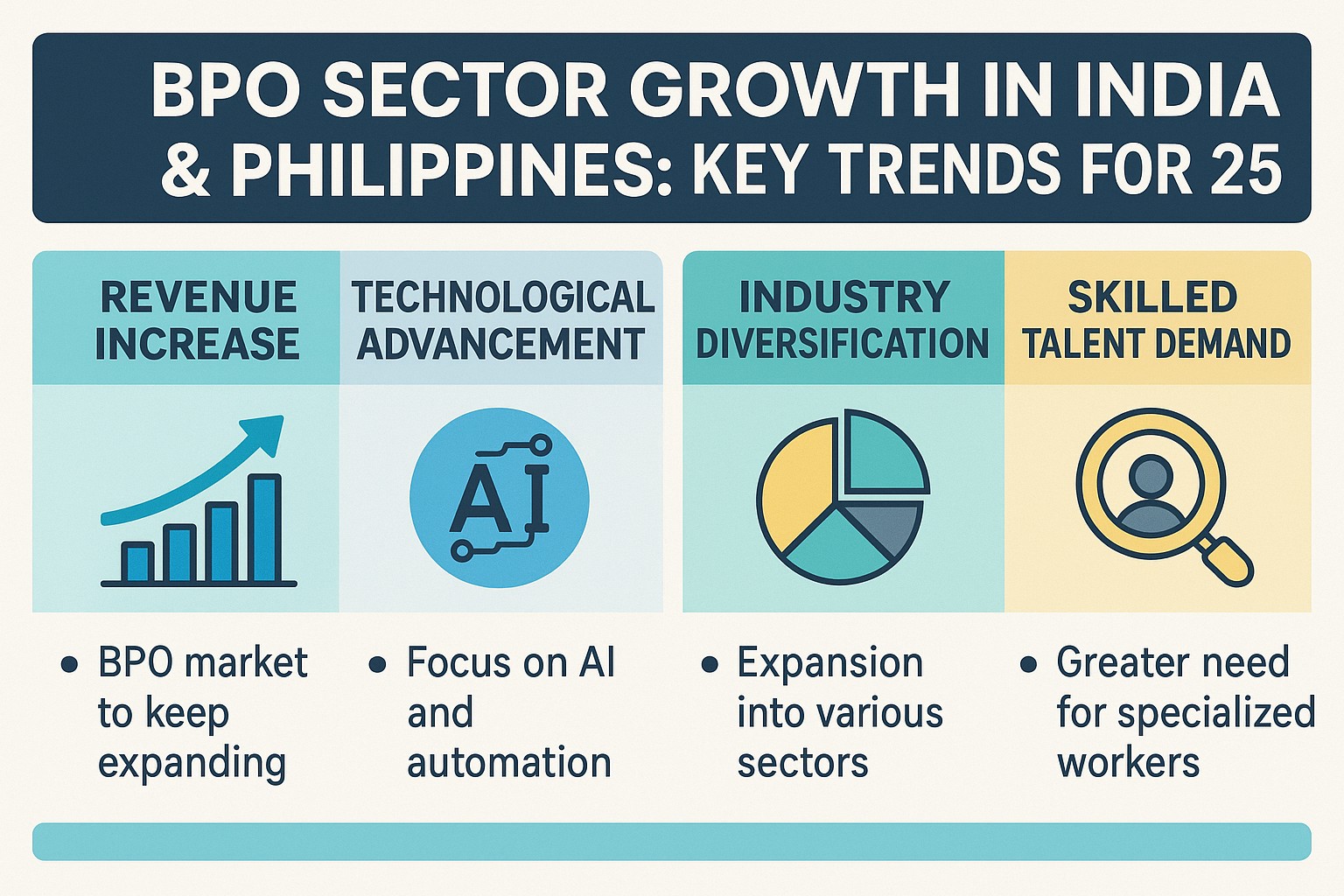The BPO sector (Business Process Outsourcing) continues to evolve and drive substantial economic growth in emerging markets like India and the Philippines. As we look ahead to 2025, the BPO sector is poised for continued expansion, fueled by increasing demand for specialized services, technological advancements, and the shift toward remote work models. Both India and the Philippines are set to play a pivotal role in the global BPO sector, providing essential services to businesses across various industries worldwide.
India’s BPO Sector: A Hub for Emerging Technologies and Job Creation
The BPO sector in India remains a dominant force in the global outsourcing market. According to a recent report from India Today read here, the BPO sector in India is expected to grow rapidly, fueled by advancements in AI/ML technologies and an expanding demand for customer service outsourcing. In addition to traditional BPO roles, there is a rising need for professionals in emerging fields such as AI, machine learning, and mental health support.
Key Growing BPO Roles in India:
-
AI & Machine Learning (ML) Specialists: The demand for AI and ML professionals is increasing as companies seek to leverage automation and data-driven insights.
-
Customer Support Representatives: With a growing focus on customer experience, the demand for skilled customer service agents in tech, finance, and e-commerce is at an all-time high.
-
Mental Health Professionals: As mental health services gain more attention, telehealth and teletherapy roles in the BPO sector are expanding.
India’s BPO sector continues to be a leader in delivering cost-effective outsourcing solutions, attracting multinational companies from around the globe. The growing focus on digital transformation and remote work is helping India’s BPO industry maintain its competitive edge.
Philippines BPO: A Thriving Hub for Customer Service Outsourcing
The Philippines is another key player in the global BPO sector. The country has long been recognized for its strength in customer service outsourcing, providing high-quality services to clients across various industries. As noted by BWorld Online read here, the Philippines’ BPO revenue is expected to reach $38 billion by 2025, driven largely by growth in sectors like healthcare outsourcing and technical support.
Key Trends in the Philippine BPO Sector:
-
Healthcare Outsourcing: The rise of telemedicine and telehealth services is creating demand for healthcare-related BPO services, including medical transcription and virtual health support.
-
Remote Work Opportunities: The shift toward remote work has provided additional opportunities for workers in the Philippines, who can now serve global clients without leaving their homes.
-
Technical Support Roles: With an increasing number of tech companies requiring customer support, technical roles in IT and customer service are on the rise in the Philippines.
As the BPO sector in the Philippines continues to grow, the country remains a strong contender in the global outsourcing landscape, particularly in the customer service and IT support domains.
Global BPO Insights: Hugo Inc. Leads the Way
The BPO sector is not only growing in India and the Philippines but also gaining momentum globally. Hugo Inc., a company known for its expertise in customer service outsourcing, has been recognized by Clutch as the fastest-growing BPO company for the second consecutive year. Hugo Inc.’s success highlights the increasing reliance on third-party BPO providers for customer experience management learn more here.
Challenges and Opportunities Ahead for the BPO Sector
While the future of the BPO sector in India and the Philippines looks promising, there are challenges that need to be addressed. Competition from emerging markets, including Vietnam and Mexico, poses a risk to the dominance of India and the Philippines in the BPO landscape. Additionally, the rise of automation and artificial intelligence could displace some traditional BPO roles, particularly in routine customer support and data entry tasks.
However, these challenges also present opportunities for innovation. The BPO sector can adapt by embracing new technologies, such as AI-driven customer service solutions, and by investing in training programs to equip workers with the skills needed for more specialized and higher-value tasks.
Conclusion
The BPO sector in India and the Philippines is on the path to continued growth, with technological advancements, the rise of remote work, and a shift toward more specialized services leading the way. As both countries strengthen their positions as BPO hubs, they will continue to drive economic growth and provide significant job opportunities for millions of workers. For both businesses seeking outsourcing solutions and individuals seeking career opportunities, the BPO sector remains a dynamic and evolving field to watch as we approach 2025.


